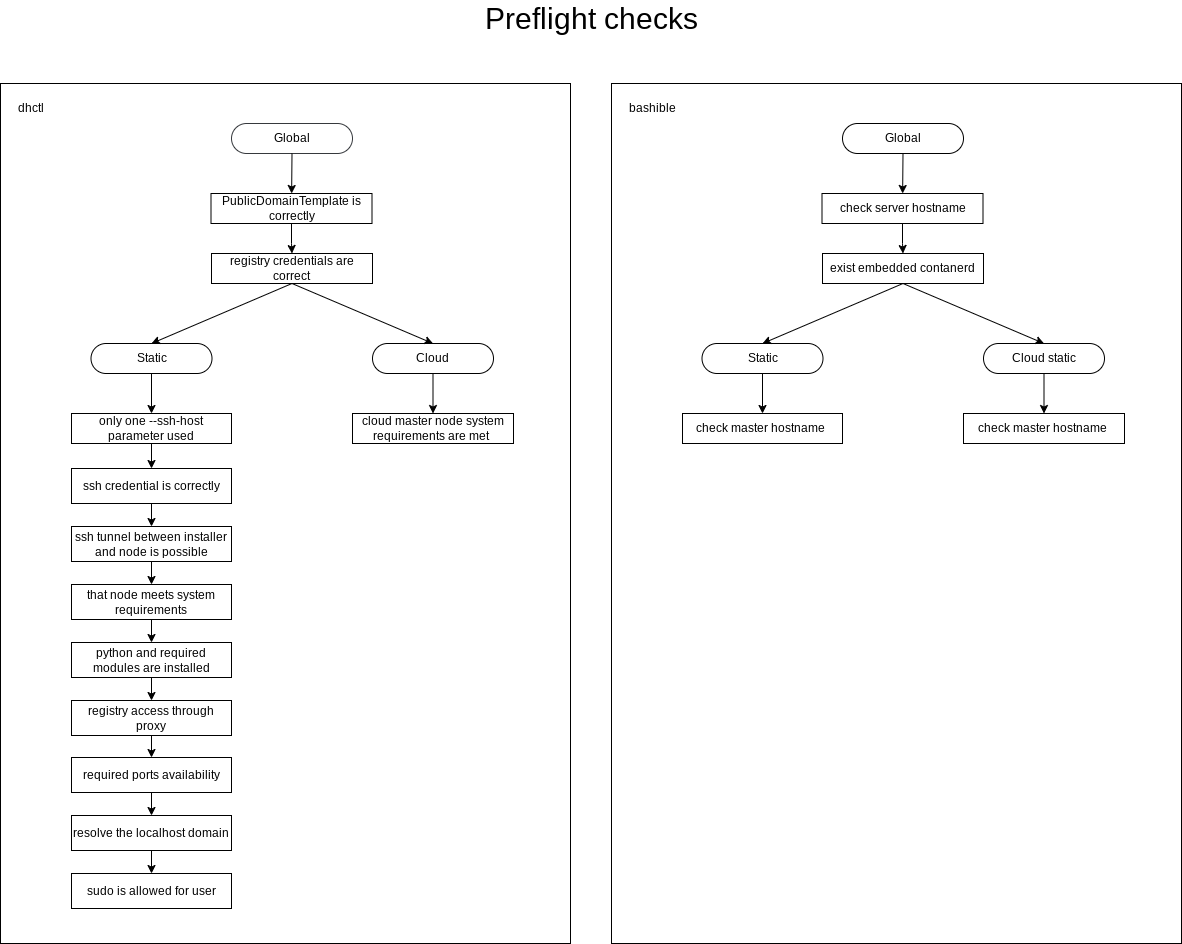Step-by-step installation instructions are available in the Getting started section.
This page provides an overview of installing Deckhouse Kubernetes Platform (DKP).
Installation methods
You can install DKP using a CLI installer, which is available as a container image and based on the dhctl utility.
Installation options
You can install DKP in the following ways::
-
In a supported cloud. The installer automatically creates and configures all required resources (including virtual machines, network objects, etc.), deploys a Kubernetes cluster, and installs DKP. A full list of supported cloud providers is available in the Integration with IaaS section.
-
On bare-metal servers (including hybrid clusters) or in unsupported clouds. The installer configures the servers or virtual machines specified in the configuration, deploys a Kubernetes cluster, and installs DKP. Step-by-step instructions for bare metal are available in Getting started → Deckhouse Kubernetes Platform for bare metal.
-
In an existing Kubernetes cluster. The installer deploys DKP and integrates it with the current infrastructure. Step-by-step instructions for an existing cluster are available in Getting started → Deckhouse Kubernetes Platform in existing cluster.
Installation requirements
To estimate the resources required for Deckhouse Kubernetes Platform installation, refer to the following guides:
Before installation, ensure the following:
-
For bare-metal clusters (including hybrid clusters) and installations in unsupported clouds: the server runs an OS from the supported OS list (or a compatible version) and is accessible via SSH with a key.
-
For supported clouds: the required resource quotas are available and access credentials to the cloud infrastructure are prepared (provider-specific).
-
There is access to the Deckhouse container registry (official
registry.deckhouse.io, or a mirror).
Preparing the Configuration
Before installation, you need to prepare the installation configuration file and, if needed, a post-bootstrap script.
Installation configuration file
The installation configuration file is a set of YAML documents that contains DKP settings and manifests for cluster objects and resources to be created after installation. The configuration file is used by the CLI installer and is passed via the --config parameter (see below).
Required and optional objects/resources that may be needed in the installation configuration file:
-
InitConfiguration (required): Initial configuration parameters necessary to start DKP.
Key settings specified in this resource:
- Component placement parameters;
- The StorageClass (storage parameters);
- Access parameters for the container registry;
- Template for DNS names;
- Other essential parameters required for Deckhouse to function correctly.
-
ClusterConfiguration: General cluster parameters, such as Kubernetes (control plane components) version, network settings, CRI parameters, etc. Required, except when DKP is installed into an already existing Kubernetes cluster.
-
StaticClusterConfiguration: Parameters for a cluster deployed on bare-metal servers (including hybrid clusters) or in unsupported clouds. Required, except when DKP is installed into an already existing Kubernetes cluster.
To add worker node groups (the NodeGroup object), you may also need StaticInstance and SSHCredentials.
-
<PROVIDER>ClusterConfiguration: Parameters for integration with a cloud provider. Required when integrating DKP with a supported cloud infrastructure.
Examples of resources configuring integration with a cloud provider:
- AWSClusterConfiguration: Amazon Web Services
- AzureClusterConfiguration: Microsoft Azure
- DVPClusterConfiguration: Deckhouse Virtualization Platform
- GCPClusterConfiguration: Google Cloud Platform
- HuaweiCloudClusterConfiguration: Huawei Cloud
- OpenStackClusterConfiguration: OpenStack, OVHcloud, Selectel, VK Cloud
- VsphereClusterConfiguration: VMware vSphere
- VCDClusterConfiguration: VMware Cloud Director
- YandexClusterConfiguration: Yandex Cloud
- ZvirtClusterConfiguration: zVirt
To add cloud nodes, you also need <PROVIDER>InstanceClass objects (for example YandexInstanceClass for Yandex Cloud) that describe VM configuration in the node group (the NodeGroup object).
-
DKP module configurations.
Each module is configured (and can be enabled or disabled) with its own ModuleConfig (for example, ModuleConfig
user-authnfor theuser-authnmodule). Parameters that are allowed in the ModuleConfig object are described in the respective module documentation under “Configuration” (for example, configuration of theuser-authnmodule).A list of all Deckhouse Kubernetes Platform modules is available in the Modules section.
Some modules may be enabled and preconfigured automatically depending on the selected installation option and cluster configuration (for example, modules that provide control plane and networking functionality).
Modules often configured during installation:
global: Global DKP settings for parameters used by default by all modules and components (DNS name template, StorageClass, module component placement settings, etc.).deckhouse: Container registry access settings, the desired release channel, and other parameters.user-authn: Unified authentication.cni-cilium: Cluster networking (for example, used when installing DKP on bare metal or in an air-gapped environment).
If the cluster is created with nodes dedicated to specific workload types (for example, system or monitoring nodes), it is recommended to explicitly set the
nodeSelectorparameter in module configurations that use persistent storage volumes (for example, in thenodeSelectorparameter of theprometheusModuleConfig for theprometheusmodule). -
IngressNginxController: Parameters of the HTTP/HTTPS load balancer (Ingress controller).
-
NodeGroup: Node group parameters. Required to add worker nodes.
-
Objects for authentication and authorization such as ClusterAuthorizationRule, AuthorizationRule, User, Group, and DexProvider.
See authentication and authorization documentation for details.
Post-bootstrap script
The installer allows you to run a custom script on one of the master nodes after installation (post-bootstrap script). This script can be used for:
- Additional cluster configuration
- Collecting diagnostic information
- Integrating with external systems or other tasks
The path to the post-bootstrap script can be specified using the --post-bootstrap-script-path parameter when running the CLI installer.
Installing
When installing a commercial edition of Deckhouse Kubernetes Platform from the official container registry registry.deckhouse.io, you must first log in with your license key:
docker login -u license-token registry.deckhouse.io
The command to run the installer container from the public Deckhouse container registry:
docker run --pull=always -it [<MOUNT_OPTIONS>] registry.deckhouse.io/deckhouse/<DECKHOUSE_REVISION>/install:<RELEASE_CHANNEL> bash
Where:
<DECKHOUSE_REVISION>: DKP edition. For example,eefor Enterprise Edition,cefor Community Edition, etc.<MOUNT_OPTIONS>: Parameters for mounting files into the installer container, such as:- SSH access keys
- Configuration file
- Resource file, etc.
<RELEASE_CHANNEL>: Release channel in kebab-case format:alpha: Alpha channelbeta: Beta channelearly-access: Early Access channelstable: Stable channelrock-solid: Rock Solid channel
Here is an example of a command to run the DKP Community Edition installer container from the Stable release channel:
docker run -it --pull=always \
-v "$PWD/config.yaml:/config.yaml" \
-v "$PWD/dhctl-tmp:/tmp/dhctl" \
-v "$HOME/.ssh/:/tmp/.ssh/" registry.deckhouse.io/deckhouse/ce/install:stable bash
DKP installation is performed within the installer container using the dhctl command:
- To start the installation of DKP with the deployment of a new cluster (for all cases except installing into an existing cluster), use the command
dhctl bootstrap. - To install DKP into an already existing cluster, use the command
dhctl bootstrap-phase install-deckhouse.
To learn more about the available parameters, run dhctl bootstrap -h.
Example of running a DKP installation with cloud cluster deployment:
dhctl bootstrap \
--ssh-user=<SSH_USER> --ssh-agent-private-keys=/tmp/.ssh/id_rsa \
--config=/config.yml
Where:
/config.yml: Installation configuration file.<SSH_USER>: Username for SSH connection to the server.--ssh-agent-private-keys: Private SSH key file for SSH connection.
Pre-installation checks
Starting with version 1.74, DKP has a built-in module integrity control mechanism that protects modules from being replaced or modified. This mechanism is enabled automatically when the operating system on the cluster nodes supports the erofs kernel module. If such a support is missing, the module integrity control will be disabled and a respective monitoring alert will appear.
List of checks performed by the installer before starting Deckhouse Kubernetes Platform installation:
- General checks:
- The values of the parameters
publicDomainTemplateandclusterDomaindo not match. - The authentication data for the container registry specified in the installation configuration is correct.
- The host name meets the following requirements:
- The length does not exceed 63 characters.
- It consists only of lowercase letters.
- It does not contain special characters (hyphens
-and periods.are allowed, but they cannot be at the beginning or end of the name).
- The server (VM) has a supported container runtime (
containerd) installed. - The host name is unique within the cluster.
- The server’s system time is correct.
- The address spaces for Pods (
podSubnetCIDR) and services (serviceSubnetCIDR) do not intersect.
- The values of the parameters
- Checks for static and hybrid cluster installation:
- Only one
--ssh-hostparameter is specified. For static cluster configuration, only one IP address can be provided for configuring the first master node. - SSH connection is possible using the specified authentication data.
- SSH tunneling to the master node server (or VM) is possible.
- The server (VM) selected for the master node installation must meet the minimum system requirements:
- At least 4 CPU cores.
- At least 8 GB of RAM.
- At least 60 GB of disk space with 400+ IOPS performance.
- Linux kernel version 5.8 or newer.
- One of the package managers installed:
apt,apt-get,yum, orrpm. - Access to standard OS package repositories.
- When using
ContainerdV2as the default container runtime on cluster nodes:- Support for
CgroupsV2. - Systemd version
244. - Support for the
erofskernel module.
- Support for
- Python is installed on the master node server (VM).
- The container registry is accessible through a proxy (if proxy settings are specified in the installation configuration).
- Required installation ports are free on the master node server (VM) and on the host running the installer.
- DNS must resolve
localhostto IP address127.0.0.1. - The user has
sudoprivileges on the server (VM). - Required ports for the installation must be open:
- Port
22/TCPbetween the host running the installer and the server. - No port conflicts with those used by the installation process.
- Port
- The server (VM) has the correct time.
- The user
deckhousemust not exist on the server (VM). - The address spaces for Pods (
podSubnetCIDR), services (serviceSubnetCIDR), and internal network (internalNetworkCIDRs) do not intersect.
- Only one
- Checks for cloud cluster installation:
- The configuration of the virtual machine for the master node meets the minimum requirements.
- The cloud provider API is accessible from the cluster nodes.
- The configuration for Yandex Cloud with NAT Instance is verified.
Aborting the installation
If the installation was interrupted or issues occurred during the installation process in a supported cloud, there might be leftover resources created during the installation. To remove them, run the following command within the installer container:
dhctl bootstrap-phase abort
The configuration file provided through the --config parameter when running the installer must be the same that was used during the initial installation.
Air-gapped environment, working via proxy and using external registries
For more details on installing and updating DKP in an air-gapped environment, see the “Installing DKP in an air-gapped environment” and “Updating DKP in an air-gapped environment” guides.
Installing from an external (third-party) registry
Available in the following editions: SE, SE+, EE, CSE Lite, CSE Pro.
DKP can be installed from an external container registry or via a proxy registry inside an air-gapped environment.
DKP supports only the Bearer-token authentication scheme for container registries.
The following container registries were verified and are guaranteed to work: Nexus, Harbor, Artifactory, Docker Registry, Quay.
When working with external registries, do not use an administrator account to access them from DKP. Create a dedicated read-only account limited to the required repository in the registry. Refer to an example of creating such an account.
During installation, DKP can be configured to work with an external container registry (e.g., a proxy registry in an air-gapped environment).
Set the following parameters in InitConfiguration:
imagesRepo: <PROXY_REGISTRY>/<DECKHOUSE_REPO_PATH>/ee: Path to the DKP EE image in an external registry. Example:imagesRepo: registry.deckhouse.io/deckhouse/ee.registryDockerCfg: <BASE64>: Base64-encoded access credentials to the external registry.
If anonymous access is allowed to DKP images in the external registry, the registryDockerCfg should look as follows:
{"auths": { "<PROXY_REGISTRY>": {}}}
The provided value must be Base64-encoded.
If authentication is required to access DKP images in the external registry, the registryDockerCfg should look as follows:
{"auths": { "<PROXY_REGISTRY>": {"username":"<PROXY_USERNAME>","password":"<PROXY_PASSWORD>","auth":"<AUTH_BASE64>"}}}
Where:
<PROXY_USERNAME>: Username for authenticating to<PROXY_REGISTRY><PROXY_PASSWORD>: Password for authenticating to<PROXY_REGISTRY><PROXY_REGISTRY>: Address of the external registry in the<HOSTNAME>[:PORT]format<AUTH_BASE64>: A Base64-encoded string of<PROXY_USERNAME>:<PROXY_PASSWORD>
The final value for registryDockerCfg must also be Base64-encoded.
You can use the following script to generate the registryDockerCfg:
declare MYUSER='<PROXY_USERNAME>'
declare MYPASSWORD='<PROXY_PASSWORD>'
declare MYREGISTRY='<PROXY_REGISTRY>'
MYAUTH=$(echo -n "$MYUSER:$MYPASSWORD" | base64 -w0)
MYRESULTSTRING=$(echo -n "{\"auths\":{\"$MYREGISTRY\":{\"username\":\"$MYUSER\",\"password\":\"$MYPASSWORD\",\"auth\":\"$MYAUTH\"}}}" | base64 -w0)
echo "$MYRESULTSTRING"
To support non-standard configurations of external registries, InitConfiguration provides two additional parameters:
registryCA: Root certificate to validate the registry’s certificate (used if the registry uses self-signed certificates).registryScheme: Protocol used to access the registry (HTTPorHTTPS). The default isHTTPS.
Nexus configuration notes
When interacting with a docker-type repository in Nexus (for example, using docker pull or docker push commands), you must specify the address in the following format: <NEXUS_URL>:<REPOSITORY_PORT>/<PATH>.
Using the URL value from the Nexus repository settings is not allowed.
When using the Nexus repository manager, the following requirements must be met:
- A proxy Docker repository must be created (“Administration” → “Repository” → “Repositories”):
- The
Maximum metadata ageparameter is set to0.
- The
- Access control must be configured:
- Create a role named Nexus (“Administration” → “Security” → “Roles”) with the following privileges:
nx-repository-view-docker-<repository>-browsenx-repository-view-docker-<repository>-read
- Create a user (“Administration” → “Security” → “Users”) and assign them the Nexus role.
- Create a role named Nexus (“Administration” → “Security” → “Roles”) with the following privileges:
To configure Nexus, follow these steps:
-
Create a proxy Docker repository (“Administration” → “Repository” → “Repositories”) that points to the public Deckhouse container registry.
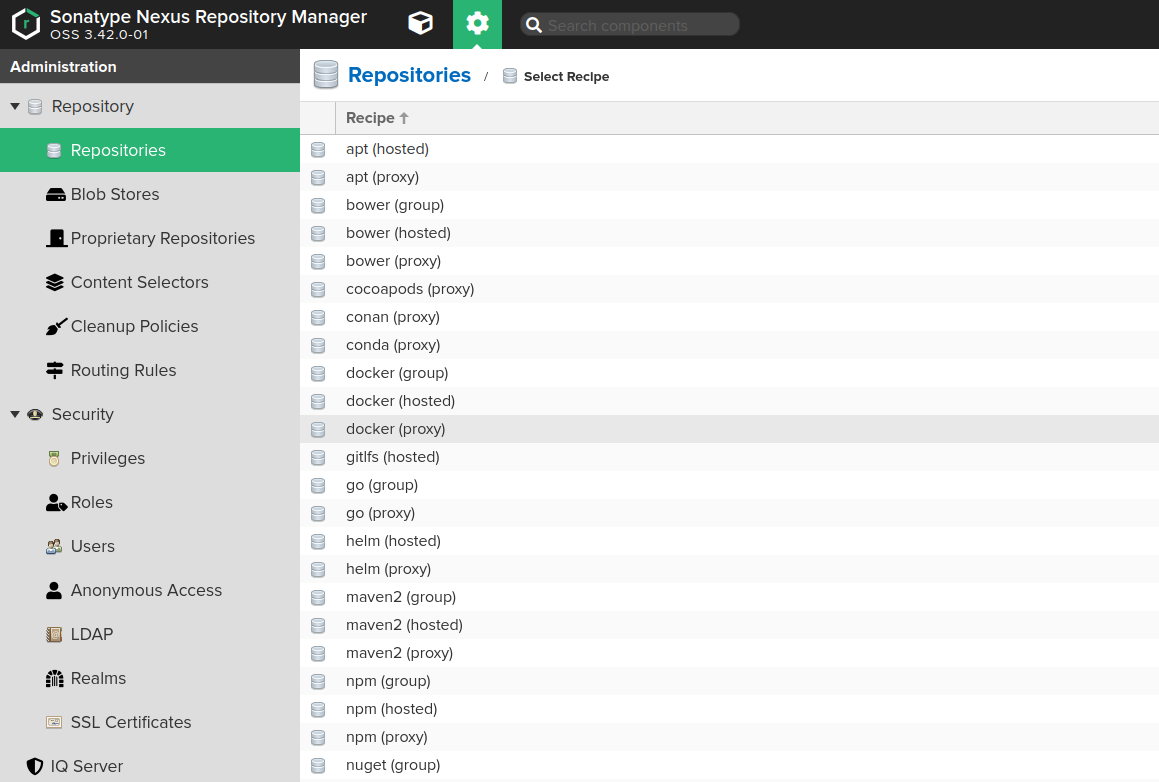
- Fill out the repository creation form with the following values:
Name: the desired repository name, e.g.,d8-proxy.Repository Connectors / HTTPorHTTPS: a dedicated port for the new repository, e.g.,8123or another.Remote storage: must be set tohttps://registry.deckhouse.io/.Auto blocking enabledandNot found cache enabled: can be disabled for debugging; otherwise, enable them.Maximum Metadata Age: must be set to0.- If using a commercial edition of Deckhouse Kubernetes Platform, enable the
Authenticationcheckbox and fill in the following:Authentication Type:Username.Username:license-token.Password: Your Deckhouse Kubernetes Platform license key.
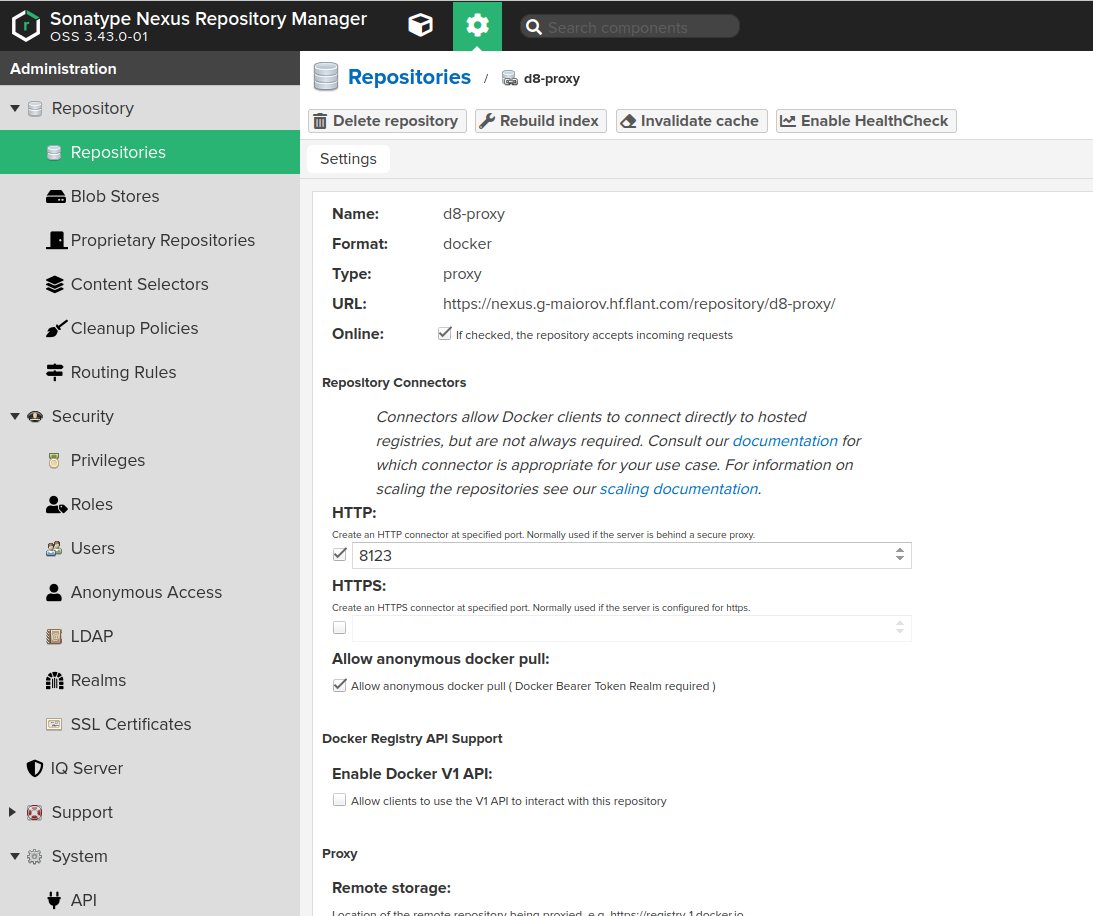
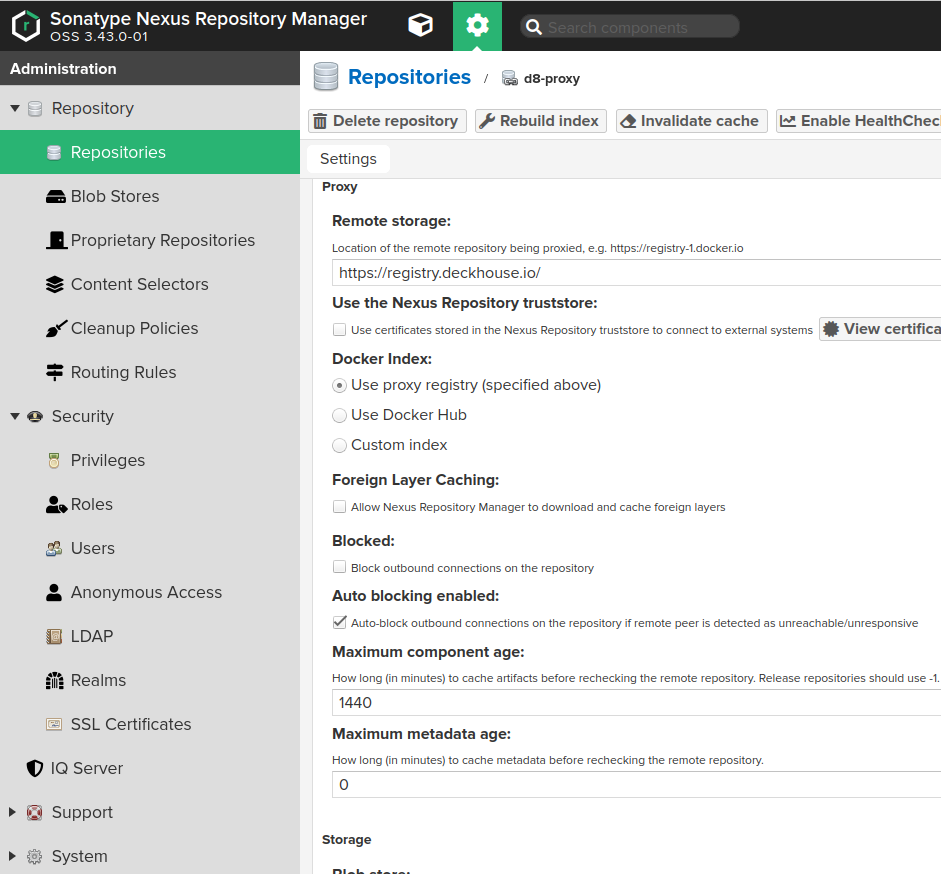
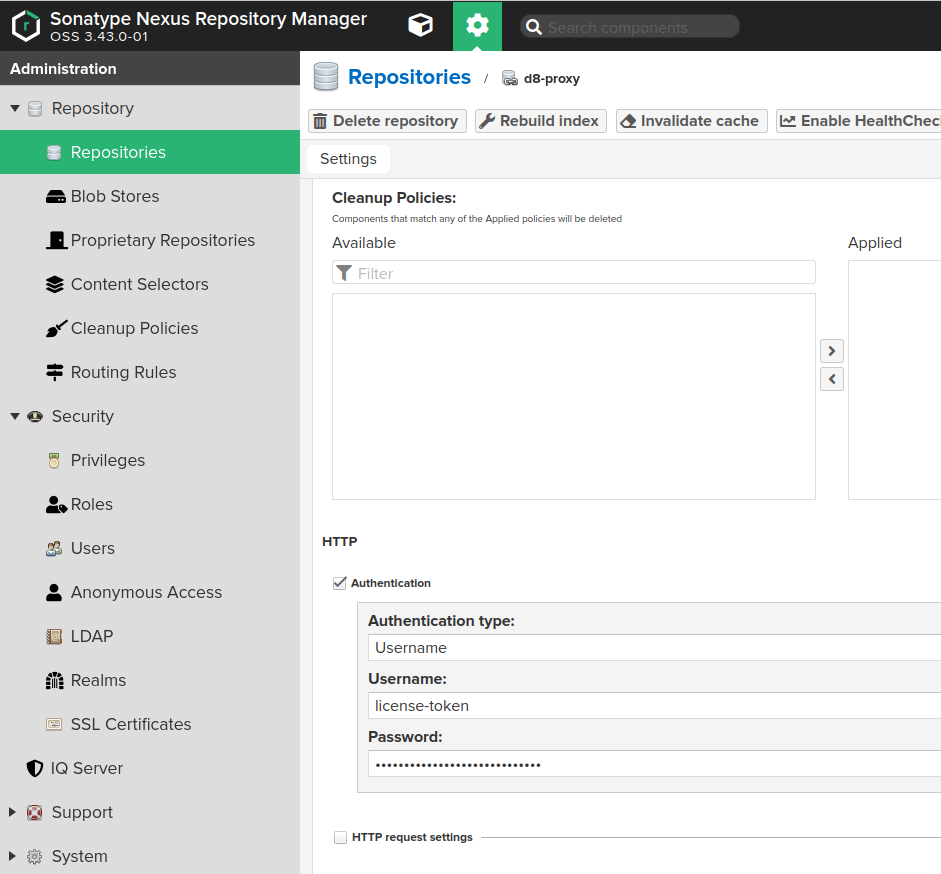
- Configure Nexus access control to allow DKP to access the created repository:
-
Create a Nexus role (“Administration” → “Security” → “Roles”) with the following privileges:
nx-repository-view-docker-<repository>-browseandnx-repository-view-docker-<repository>-read.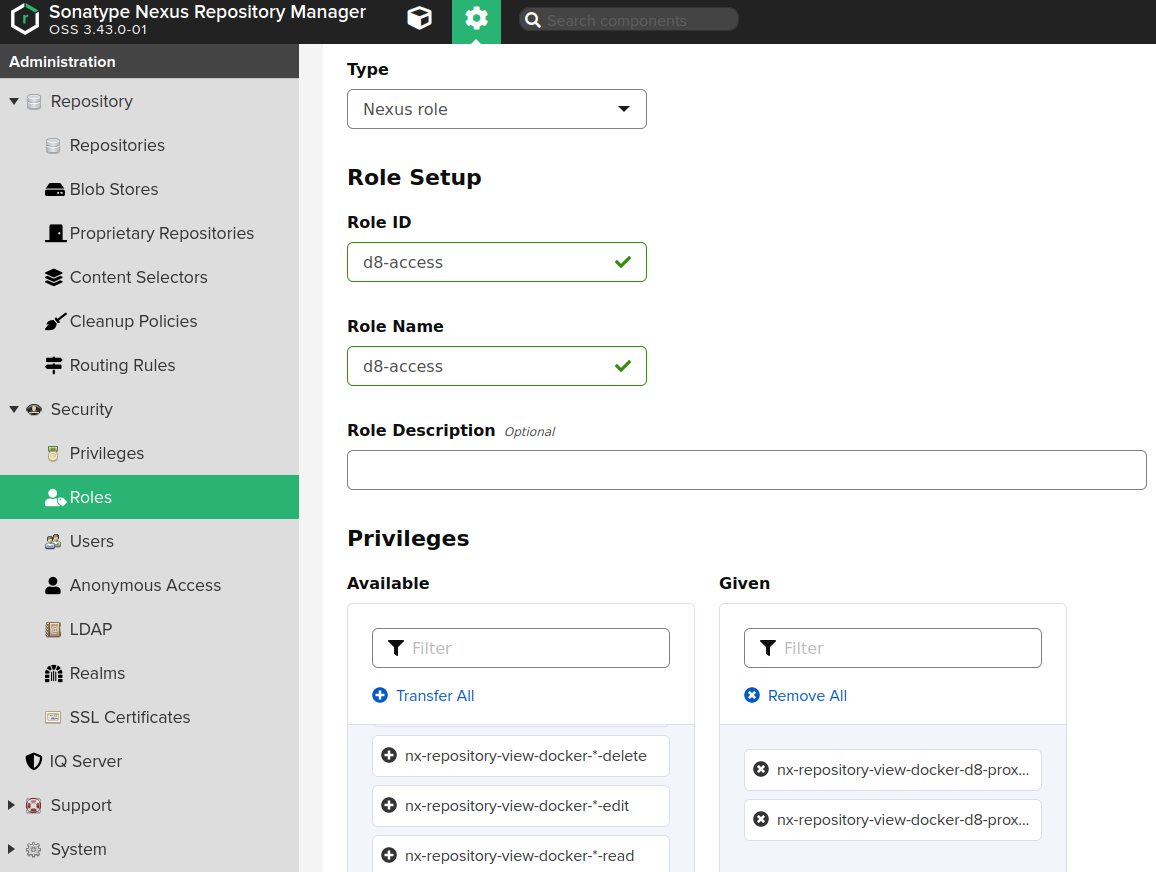
-
Create a user (“Administration” → “Security” → “Users”) and assign them the role created above.
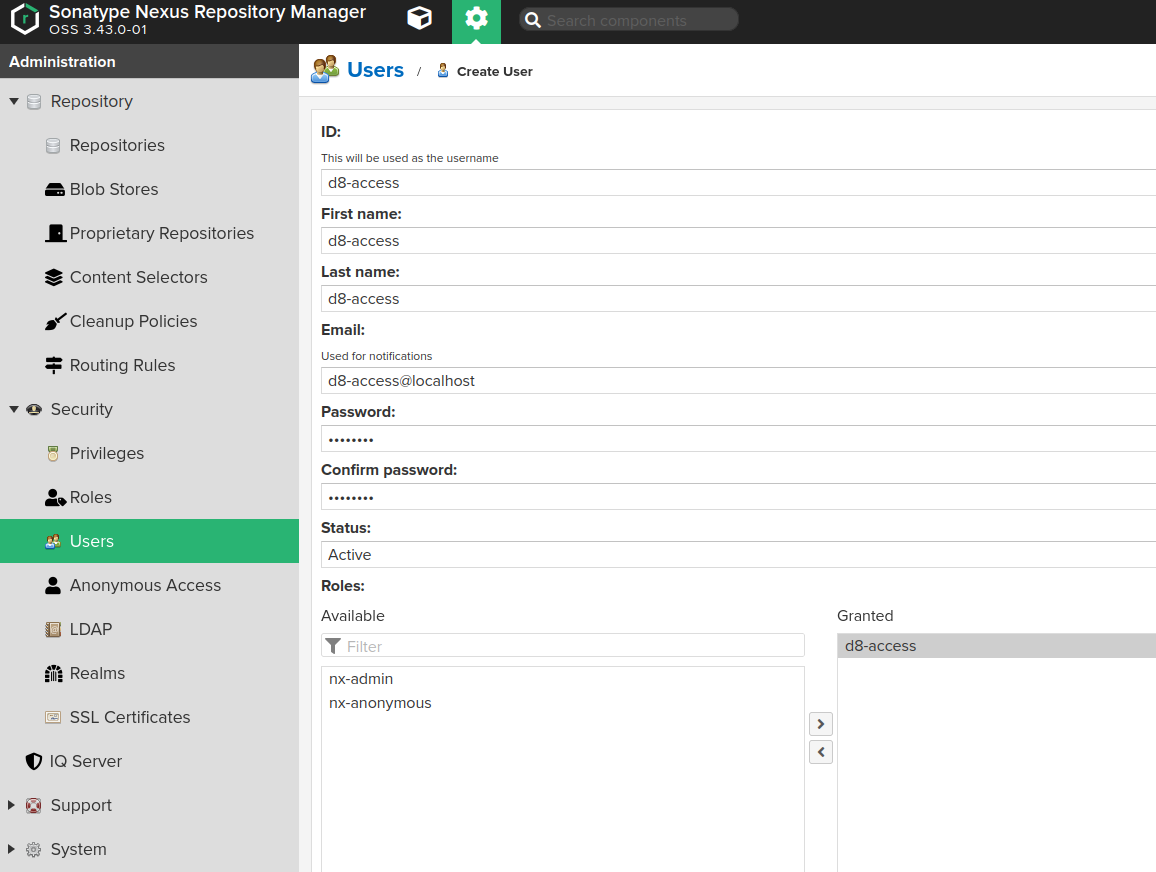
-
Enable Docker Bearer Token Realm (“Administration” → “Security” → “Realms”):
- The Docker Bearer Token Realm must be in the Active list (on the right), not in Available (on the left).
- If it is not in Active:
- Find it in the Available list.
- Move it to Active using the arrow button.
- Click Save.
- Restart Nexus (it is required for the changes to take effect).
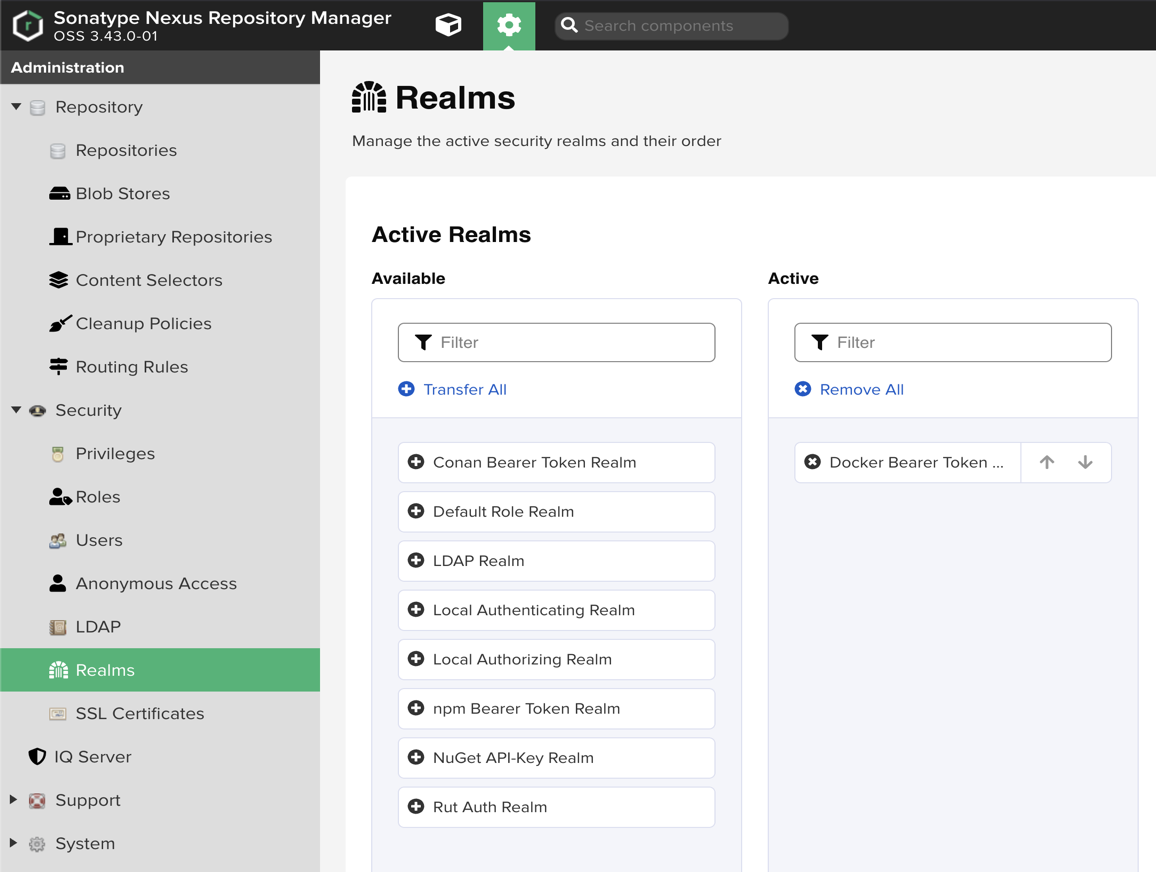
-
As a result, DKP images will be available at a URL as follows: https://<NEXUS_HOST>:<REPOSITORY_PORT>/deckhouse/ee:<d8s-version>.
Harbor configuration notes
Use the Harbor Proxy Cache feature.
- Configure the registry access:
- In the side menu, navigate to “Administration” → “Registries” and click “New Endpoint” to add a new endpoint for the registry.
- In the “Provider” dropdown list, select “Docker Registry”.
- In the “Name” field, enter an endpoint name of your choice.
- In the “Endpoint URL” field, enter
https://registry.deckhouse.io. - In the “Access ID” field, enter
license-token. - In the “Access Secret” field, enter your Deckhouse Kubernetes Platform license key.
- Set any remaining parameters as necessary.
- Click “OK” to confirm creation of a new endpoint for the registry.
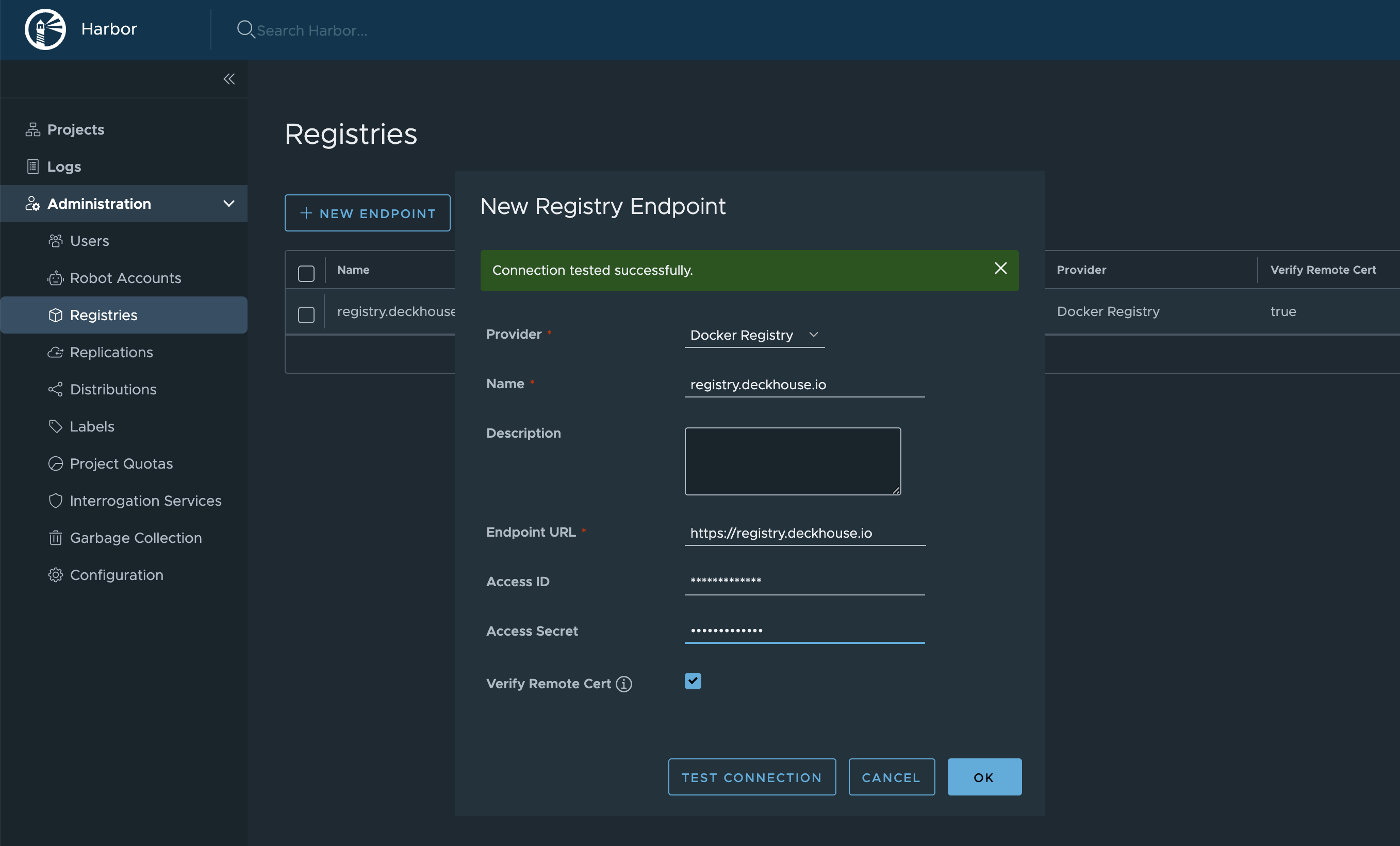
- Create a new project:
- In the side menu, navigate to “Projects” and click “New Project” to add a project.
- In the “Project Name” field, enter a project name of your choice (for example,
d8s). This name will be a part of the URL. - In the “Access Level” field, select “Public”.
- Enable “Proxy Cache” and in the dropdown list, select the registry created earlier.
- Set any remaining parameters as necessary.
- Click “OK” to confirm creation of a new project.
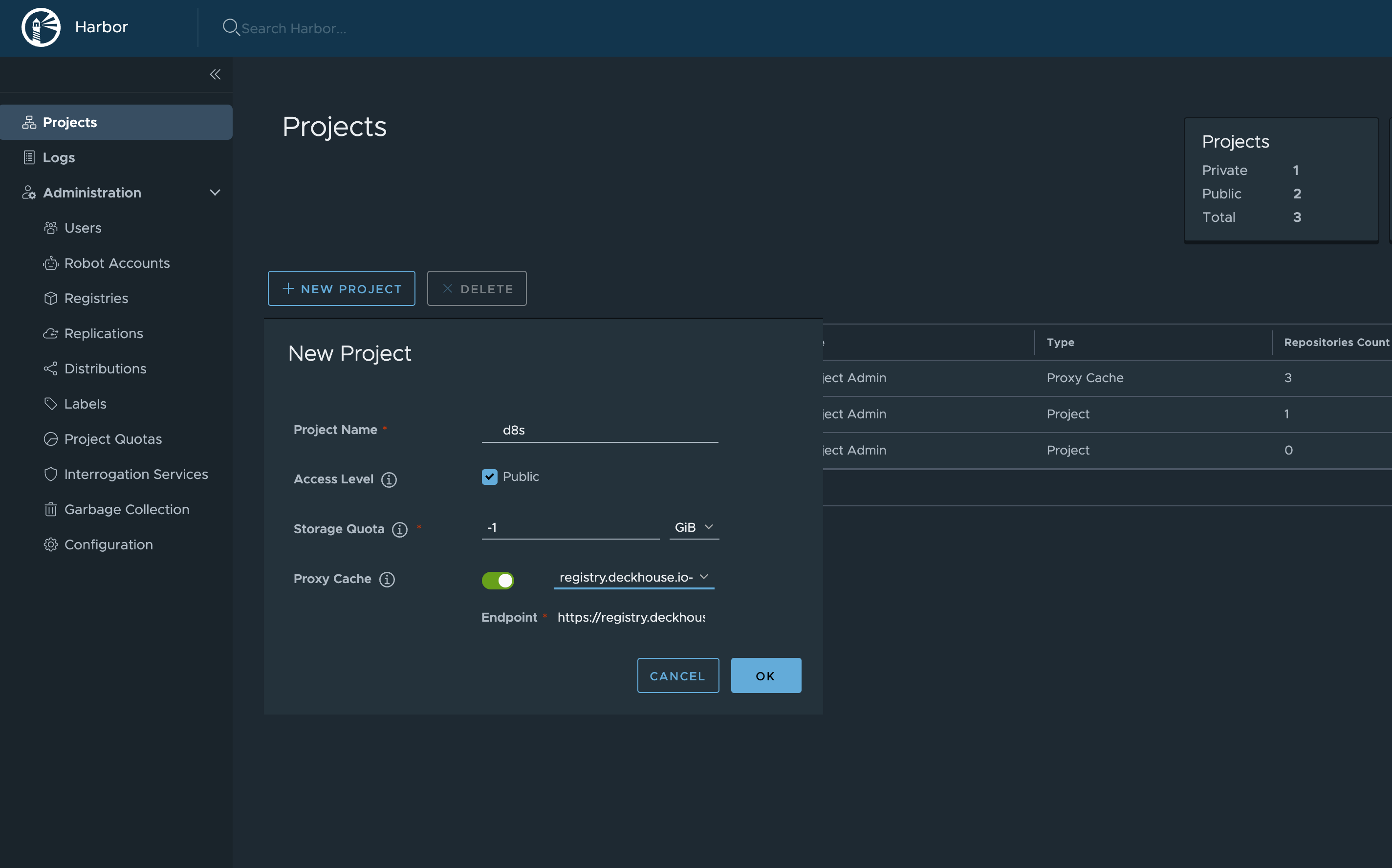
Once Harbor is configured, DKP images will be available at a URL as follows: https://your-harbor.com/d8s/deckhouse/ee:{d8s-version}.
Manual loading of DKP images and vulnerability DB into a private registry
The d8 mirror utility is not available for use with the Community Edition (CE) and Basic Edition (BE).
You can check the current status of versions in the release channels at releases.deckhouse.io.
-
Download DKP images to a dedicated directory using the
d8 mirror pullcommand.By default,
d8 mirror pulldownloads only the current versions of DKP, vulnerability scanner databases (if included in the DKP edition), and officially delivered modules. For example, for Deckhouse Kubernetes Platform 1.59, only version 1.59.12 will be downloaded, as it is sufficient for upgrading the platform from 1.58 to 1.59.Run the following command (specify the edition code and license key) to download the current version images:
d8 mirror pull \ --source='registry.deckhouse.io/deckhouse/<EDITION>' \ --license='<LICENSE_KEY>' /home/user/d8-bundleWhere:
--source: Address of the Deckhouse container registry.<EDITION>: Deckhouse Kubernetes Platform edition code (for example,ee,se,se-plus). By default, the--sourceparameter refers to the Enterprise Edition (ee) and can be omitted.--license: Parameter for specifying the Deckhouse Kubernetes Platform license key for authentication in the official container registry.<LICENSE_KEY>: Deckhouse Kubernetes Platform license key./home/user/d8-bundle: Directory where the image packages will be placed. It will be created if it does not exist.
If the image download is interrupted, rerunning the command will resume the download, provided no more than one day has passed since the interruption.
Example command to download all DKP EE versions starting from version 1.59 (specify your license key):
d8 mirror pull \ --license='<LICENSE_KEY>' \ --since-version=1.59 /home/user/d8-bundleExample command to download the current DKP SE versions (specify your license key):
d8 mirror pull \ --license='<LICENSE_KEY>' \ --source='registry.deckhouse.io/deckhouse/se' \ /home/user/d8-bundleExample command to download DKP images from an external registry:
d8 mirror pull \ --source='corp.company.com:5000/sys/deckhouse' \ --source-login='<USER>' --source-password='<PASSWORD>' /home/user/d8-bundleExample command to download the vulnerability scanner database package:
d8 mirror pull \ --license='<LICENSE_KEY>' \ --no-platform --no-modules /home/user/d8-bundleExample command to download all available additional module packages:
d8 mirror pull \ --license='<LICENSE_KEY>' \ --no-platform --no-security-db /home/user/d8-bundleExample command to download module packages
strongholdandsecrets-store-integration:d8 mirror pull \ --license='<LICENSE_KEY>' \ --no-platform --no-security-db \ --include-module stronghold \ --include-module secrets-store-integration \ /home/user/d8-bundleExample command to download
strongholdmodule with semver^constraint from version 1.2.0:d8 mirror pull \ --license='<LICENSE_KEY>' \ --no-platform --no-security-db \ --include-module stronghold@1.2.0 \ /home/user/d8-bundleExample command to download
secrets-store-integrationmodule with semver~constraint from version 1.1.0:d8 mirror pull \ --license='<LICENSE_KEY>' \ --no-platform --no-security-db \ --include-module secrets-store-integration@~1.1.0 \ /home/user/d8-bundleExample command to download exact version of
strongholdmodule 1.2.5 and publish to all release channels:d8 mirror pull \ --license='<LICENSE_KEY>' \ --no-platform --no-security-db \ --include-module stronghold@=v1.2.5 \ /home/user/d8-bundle
-
On the host with access to the container registry where DKP images should be uploaded, copy the downloaded DKP image bundle and install the Deckhouse CLI.
-
Upload DKP images to the registry using the
d8 mirror pushcommand.The
d8 mirror pushcommand uploads images from all packages located in the specified directory. If you only want to push specific packages, you can either run the command separately for each TAR image bundle by specifying the direct path to it, or temporarily remove the.tarextension from unwanted files or move them out of the directory.Example command to upload image packages from the
/mnt/MEDIA/d8-imagesdirectory (provide authentication data if required):d8 mirror push /mnt/MEDIA/d8-images 'corp.company.com:5000/sys/deckhouse' \ --registry-login='<USER>' --registry-password='<PASSWORD>'Before uploading the images, make sure that the target path in the container registry exists (in the example,
/sys/deckhouse) and that the account used has write permissions.If you’re using Harbor, you won’t be able to upload images to the root of a project. Use a dedicated repository within the project to store DKP images.
-
After uploading the images to the registry, you can proceed with installing DKP. Use the getting-started guide.
When running the installer, use the address of your own image registry (where the images were uploaded earlier) instead of the official public DKP container registry. For the example above, the installer image address will be
corp.company.com:5000/sys/deckhouse/install:stableinstead ofregistry.deckhouse.io/deckhouse/ee/install:stable.Use your registry address and authorization data during installation (e.g., InitConfiguration parameters imagesRepo, registryDockerCfg, or Step 3 of the Quick Start Guide).
Creating a cluster and running DKP without using release channels
This method should only be used if your private (isolated) registry does not contain images with release channel metadata.
If you need to install DKP with automatic updates disabled:
- Use the installer image tag corresponding to the desired version. For example, to install release
v1.44.3, use the imageyour.private.registry.com/deckhouse/install:v1.44.3. - Specify the appropriate version number in the
deckhouse.devBranchparameter of InitConfiguration.Do not specify the
deckhouse.releaseChannelparameter in InitConfiguration.
If you want to disable automatic updates in an already running DKP installation (including patch updates), remove the releaseChannel parameter from the deckhouse module configuration.
Using a proxy server
Available in the following editions: BE, SE, SE+, EE, CSE Lite, CSE Pro.
To configure DKP to work with a proxy server, use the proxy parameter of the ClusterConfiguration resource.
Example:
apiVersion: deckhouse.io/v1
kind: ClusterConfiguration
clusterType: Cloud
cloud:
provider: OpenStack
prefix: main
podSubnetCIDR: 10.111.0.0/16
serviceSubnetCIDR: 10.222.0.0/16
kubernetesVersion: "Automatic"
cri: "Containerd"
clusterDomain: "cluster.local"
proxy:
httpProxy: "http://user:password@proxy.company.my:3128"
httpsProxy: "https://user:password@proxy.company.my:8443"
Automatic proxy variable loading for users in CLI
Starting from version 1.67, the /etc/profile.d/d8-system-proxy.sh file is no longer configured in DKP to set proxy variables for users.
To automatically load proxy variables for users in CLI, use the NodeGroupConfiguration resource:
apiVersion: deckhouse.io/v1alpha1
kind: NodeGroupConfiguration
metadata:
name: profile-proxy.sh
spec:
bundles:
- '*'
nodeGroups:
- '*'
weight: 99
content: |
{{- if .proxy }}
{{- if .proxy.httpProxy }}
export HTTP_PROXY={{ .proxy.httpProxy | quote }}
export http_proxy=${HTTP_PROXY}
{{- end }}
{{- if .proxy.httpsProxy }}
export HTTPS_PROXY={{ .proxy.httpsProxy | quote }}
export https_proxy=${HTTPS_PROXY}
{{- end }}
{{- if .proxy.noProxy }}
export NO_PROXY={{ .proxy.noProxy | join "," | quote }}
export no_proxy=${NO_PROXY}
{{- end }}
bb-sync-file /etc/profile.d/profile-proxy.sh - << EOF
export HTTP_PROXY=${HTTP_PROXY}
export http_proxy=${HTTP_PROXY}
export HTTPS_PROXY=${HTTPS_PROXY}
export https_proxy=${HTTPS_PROXY}
export NO_PROXY=${NO_PROXY}
export no_proxy=${NO_PROXY}
EOF
{{- else }}
rm -rf /etc/profile.d/profile-proxy.sh
{{- end }}
